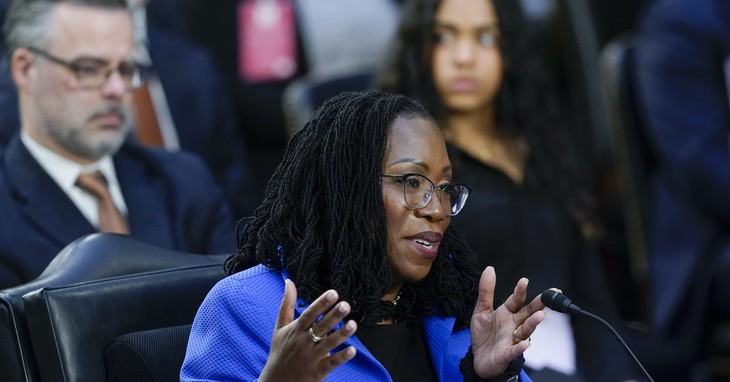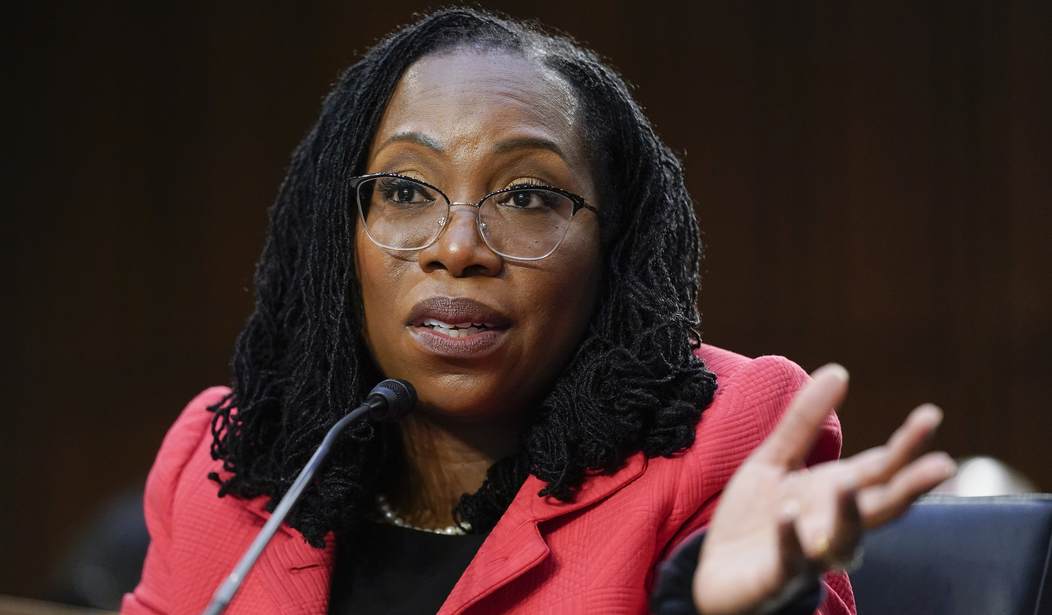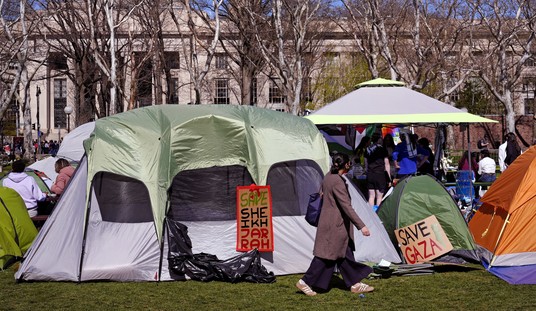A lot of the reaction to the Senate confirmation hearings of Ketanji Brown Jackson has centered around her responses to questions about her sentencing practices, what a woman is, and when life begins. We have covered those pretty extensively ourselves.
But there are several other issues at play that are troublesome for those who wish to see a Supreme Court restrained and judicial activism put to a stop. One of those is the ability of the Supreme Court to create new rights that don’t exist anywhere in the Constitution (much like the Court did in Roe v. Wade).
Buried underneath all the talk about child pornography and biology is this line of questioning from Senators John Kennedy, Marsha Blackburn, John Cornyn, Ben Sasse, and Mike Lee.
Despite many questions on unenumerated rights, Jackson steadfastly dodged answering them. Concern among conservatives is that, should progressive judges regain the majority on the bench, they will use that position to craft new rights through a very broad interpretation of other rights. This isn’t some made-up concern, either. Biden explicitly said that’s what he wants from his pick.
The President himself may have more knowledge of the inner workings of the Supreme Court nominations process than nearly any politician in Washington. He served as the Chairman of the Judiciary Committee for eight years, overseeing six Supreme Court confirmation hearings.
Biden laid out on Tuesday what he and his team will look for in this nominee. Speaking to reporters, Biden said he views the Constitution as a document that is “always evolving slightly in terms of additional rights or curtailing rights.” Referring to notes on a long, white card in his hand, Biden explained he is looking for a nominee with “character” who is “courteous to the folks before them,” treats people “with respect,” and has a judicial philosophy that suggests there are “unenumerated rights in the Constitution.”
That type of rhetoric clearly perked the ears of the Republicans on the Senate Judiciary Committee, which had several questions for Jackson, most of which she refused to answer. It started with Cornyn.
CORNYN: Do you share my concern that when the court takes on the role of identifying an unenumerated, right, in other words, is not mentioned in the Constitution. And creates a new, right, declaring that anything conflicting with that is unconstitutional. That it creates a circumstance for those who may hold traditional beliefs like something as important as marriage, that they will be vilified, as unwilling to assent to this new orthodoxy?
JACKSON: So, Senator, I understand that concern, and because there are cases that are addressing these sorts of issues. I’m not in a position to comment about either my personal views or whether or not…
Kennedy dug deeper, asking where judicial restraint plays into the court’s creation of these brand new rights.
KENNEDY: OK. When you talk about judicial restraint, where does the restraint start with fundamental right? Let’s take the ninth amendment, OK? What does it say? I know you know because you talked about it earlier.
JACKSON: Well, it says that, it indicates that there are rights that — the fact that there are some enumerated rights in the Constitution doesn’t mean that there aren’t others.
KENNEDY: And how are we supposed to determine what others there are?
JACKSON: I think the Supreme Court has not found any others coming from that particular constitutional provision.
KENNEDY: Could they?
JACKSON: I can’t speak to that, Senator.
KENNEDY: I mean, it’s possible, right, if they get five votes, right?
JACKSON: Well, any time the Supreme Court has five votes, then they have a majority for whatever opinion they determine.
KENNEDY: But do you think that would be a prudent course of action to start creating fundamental rights through the Ninth Amendment, unenumerated now, without consulting Congress?
JACKSON: Senator, I can’t speak to a hypothetical about whether or not it would be a prudent course of action for the Supreme Court to hold that there were other rights in the Ninth Amendment that’s…
That was on Tuesday. On Wednesday, Kennedy continued questioning her on the issue.
KENNEDY: Then how do you explain or help me understand the following. We have a judicially created doctrine with no textual basis either in the Constitution or a statute called substantive due process. And through substantive due process, our Federal Courts let’s just narrow it down the United States Supreme Court has given itself the authority to read into the Constitution unenumerated, unmentioned rights.
Not read the Constitution and say, well, there already is freedom of speech, but these are unmentioned, unenumerated. Isn’t that making policy?
JACKSON: Senator, the Supreme Court interprets revisions of the Constitution and there are provisions of the Constitution that require interpretation because they don’t just on the text in every circumstance answer the question before the Court. So, due process, what does that mean? And the Supreme Court has the words due process do appear in the text of the Constitution and the question is, what is covered by that provision? The Supreme Court — oh, sorry.
KENNEDY: I’m just going say…
JACKSON: Go ahead.
KENNEDY: … but when they do it, aren’t they making policy?
JACKSON: Well, Senator, the role of the judiciary is to interpret the law to the extent that somebody argues to the Court that there’s been a violation of the Due Process Clause of the Constitution. It is within the role of the Court to determine what that means, whether the person is correct that what happened with respect to their case violated the Due Process Clause, and so there’s an interpretive function that is a part of the judicial function.

A year ago, when she was up for nomination before the Senate for the D.C. Circuit, she claimed that she lacked experience with constitutional cases to have a view on how to interpret the Constitution. However, she reinforced her claim this week that she had the authority as a judge to review an immigration policy that was within its statutory bounds as detailed by Congress — it was a decision, she acknowledged, that was overturned on appeal.
That should be a bigger warning flag for conservatives than her inability to publicly state when life begins. She has her personal beliefs, she says, but does not let those get in the way of her duties as a judge. But on the other hand, her duties as a judge apparently allow her to invent judicial review in a manner that was deemed inappropriate by even an Obama-appointed judge. She clearly sees herself as someone in a position to use the bench to create new rules, interpretations, and rights where there are none. That is something Republicans absolutely will not stand for, particularly on the issues that are hot at the moment. Issues that are likely to appear before the Court sooner rather than later.
For example, if she and the progressive judges regain the majority, she will be more than happy to invent the right of a transgender athlete to compete in women’s sports — an unenumerated right that would, among other things, negatively impact others’ First Amendment rights.
She could not say this publicly. As I mentioned earlier this week, she was clearly prepped to avoid saying such things. So she has to say she doesn’t have an opinion or that her opinion isn’t “appropriate” to share — all code for “Oh boy, do I have an opinion. But you won’t like it and I don’t want it to be a distraction.” Because it would be a distraction.
Not to her confirmation, mind you. That’s pretty much assured. But her actual opinions on the issue of what makes a woman a woman, when life begins, and what the role of the judiciary actually is would give many American voters pause. And ahead of a virtually guaranteed bad election cycle for Democrats, they don’t want to give voters any more pause than they already have. The Democrats are terrified of these views actually getting out there.
But Republicans should oppose Jackson’s nomination, even though they’ll lose on the issue. She will be confirmed along party lines (or close to them) and she’ll sit on the Supreme Court. And, yes, it will be historical and more reflective of the American populace. But that is less important than good jurisprudence.













Join the conversation as a VIP Member